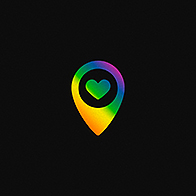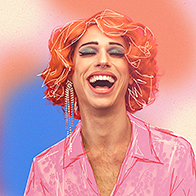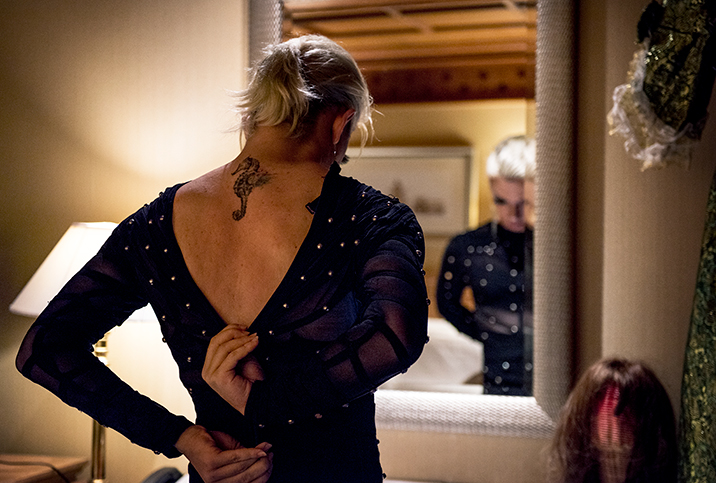Delayed Dating Maturity and My Queer Dating Experience

You'd be hard-pressed to find someone in the LGBTQIA+ community who says we come of age in the same manner as our straight, cisgender counterparts. In fact, the opposite holds true—queer folks routinely mature early in life to defend themselves, but simultaneously experience a delay in learning vital relationship skills.
There are several reasons for this difference, but the most prominent is that their relationship experiences are uniquely shaped by their identity and maturity developmental state, according to a 2015 study published in the Journal of Family Psychology. Another possible factor pinpointed by the study was the stress of emerging adulthood responsibilities combined with navigating family relationships only experienced by people who identify as LGBTQIA+, such as coming out.
This dynamic leaves many at a unique disadvantage when they enter college, a time period generally considered critical to relationship-building.
I, like many queer people, felt that disadvantage keenly. In addition to every other earth-moving change that college brings, I simply didn't have a clear view of what a romantic relationship was supposed to look like.
A tale of two semesters
I met my first-year roommate online in the summer of 2017. After he sent me a message asking to room together, we hit it off and decided to date long-distance, before breaking up a month later and opting to be friends.
That dream did not last long. When I arrived in San Diego that fall, he switched from friendly to silent, only contacting me if he locked himself out of the room. Having to come home to someone who seemingly wanted nothing to do with me, and who I still wanted intimacy with, made it difficult to settle into my new life.
A few months later, he broke the silence and suggested we talk, before suggesting we make out. To my regret, I agreed. After this, he went silent again, telling me to get used to the cold shoulder because "some people aren't meant to be friends." When it was time to move out that summer, I hoped to put the drama behind me.
Coming out is not a singular moment, but a lifelong process, due to all kinds of sociocultural and psychological factors.
For my roommate and myself, our tense relationship was due in part to the coming out process. Queer people know it firsthand and the National Institute of Health agrees: Coming out is not a singular moment, but a lifelong process, due to all kinds of sociocultural and psychological factors.
This variability means queer folks are always at differing levels along their self-acceptance journey, making it easier for strained relationships like mine to occur. My roommate and I were at different levels of personal comfort with our sexualities, a duality that created discomfort with one another.
Romance rekindled?
INSTAGRAM: Hey Jacob, I wanted to clear the air and talk about what happened between us last...
I scream, throwing my phone across the room at the sight of the notification.
Despite my better judgment, I invited my first-year roommate over that evening in January 2019, and we spent several hours rehashing what happened. When he left, I went to sleep feeling genuine closure.
Over the next few months, he would attempt to be my closest friend—a period of time in which I redeveloped feelings for him—before, again, pivoting to silence. I later confided my feelings to him, to which he replied: "I want to be friends :)." I left that summer thinking our role in each other's lives was finally over.
When I returned for summer school, however, my first-year roommate began acting like my friend. We shared a class, and that July our "relationship" seemed almost normal—we would have weekly "smoke-and-study" sessions, trading notes as we finished off bowls and Netflix marathons.
In the absence of queer relationship development norms, emerging LGBTQIA+ adults 'may model their first partnerships after heterosexual relationships.'
Shortly after summer school ended, we were running errands and I could tell something was off. After enough prodding, he opened up: His family had cut him off financially and ceased communication with him, and he was worried about how he would make rent.
"You never have to be embarrassed to ask for help from me," I said, not realizing how much of a mistake I was making.
What followed the next few months were numerous requests for moral, and financial, support. Aside from asking for help with rent—which came with the promise he would pay me back—he found out his green card had expired. I suggested we get married to solve his legal issues.
This plan was stopped by me having to fly to my hometown because my grandma had a stroke. When I returned a few weeks later, my first-year roommate's silence resumed, but this time it bothered me much more than before. I sent him a lengthy message a few months later discussing my emotions on the situation, how troubled I was by our relationship and how toxic his dependency was.
This message was left unread, but after a few weeks of prodding from my friends, I started sending him Venmo requests. I had not set out to do this with the intent of him paying me back—it was more to try to get a response from him.
iMessage: Hey Jacob. I'm sorry I didn't get back to you sooner. I was trying to find the right words to say. First, I'm working on saving up the money to pay you back. I always keep my promises, and I'm so grateful for all you have done. Second, I don't want a relationship with you, but I love you and I still want you in my life.
His decision to tell me that he loved me hurt the most, but I dismissed it so I could try to move on. He paid me back shortly after, and at the beginning of January 2020, I deleted his number.
Learning maturity and gaining closure
Straight relationships are fundamentally different from queer ones. As noted by a 2015 study from Northwestern University, there are two main perspectives on straight relationships. The first is stage models, which define straight relationships as following linear "stages associated with escalating levels of commitment." The second is process models, which "propose that interpersonal processes such as closeness, trust, interdependence and commitment are the mechanisms that propel relationships in different directions."
These models are internalized by society. That said, in the absence of queer relationship development norms, emerging LGBTQIA+ adults "may model their first partnerships after heterosexual relationships. [These models] are limited in their ability to guide [LGBTQIA+] adults when their relationships diverge from or are not represented in heterosexual scripts."
Delayed dating maturity does not have to be viewed as negative, but rather an opportunity to grow as individuals on unique life paths.
I clung to the straight relationship standard because I believed dating maturity meant upholding this "script." My experiences with my first-year roommate were guided by trying to steer the course of our relationship toward the straight standard, even though it would have been much more beneficial to cut off the relationship entirely.
As queer folks, it's important to recontextualize what our vision for a relationship looks like rather than modeling it after something that society has set as the norm. Delayed dating maturity does not have to be viewed as negative, but rather an opportunity to grow as individuals on unique life paths.




















